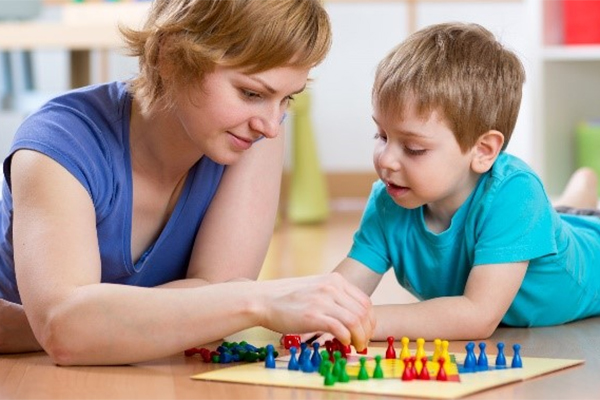The Benefit of Board Games for Kids
BY DIANE NANCARROW, MA, CCC-SLP
Speech-Language Pathologist
If you’re hearing “I’m bored!” from your kids on a regular basis, here’s an answer that sounds the same but is so much more fun: board games! Time at home with kids is a great opportunity to dust off those old games and remember the benefits of playing them as a family.
Between smartphones, tablets, gaming systems and other devices, kids end up playing many games by themselves. And let’s face it: pressing buttons on a device is a lot easier than laying out a board, passing out money, moving your token, etc.
While many electronic games engage children in new and exciting ways, and some even involve physical movement, board games also provide important learning opportunities. Since they are rarely completed in a few short minutes, they encourage sustained attention. Players must wait for others to complete their turns while planning their own moves.
When you play with your children, you help prepare them to play with others. They will have the chance to respond to real people, watch facial expressions, body language, tone of voice, and the timing of their opponents. No matter if there are good losers or bad winners, all responses can be teaching moments.
SOME EXTRA BENEFITS:
- Scrabble’s wooden tiles give wonderful tactile pleasure.
- Trouble’s plastic dome forces a child to look and listen to the dice as they change.
- Chutes and Ladders teaches one-to-one correspondence as kids move their markers and count the boxes.
- Candy Land teaches colors.
- Monopoly encourages cooperation when choosing who gets which iconic token.
- Parcheesi, Checkers, Sorry, and Aggravation support turn-taking, strategy building, and patience (there is no prompt that provides a cue, clue, or suggestion how to win).
Board games appeal to our senses and are great to touch, see, and hear. There is hope in flicking the spinner and power in moving your token. The best part about playing board games is the pleasure of playing with another person. Sometimes, winning isn’t the goal. You are making memories with your children. Being together is the best part!
